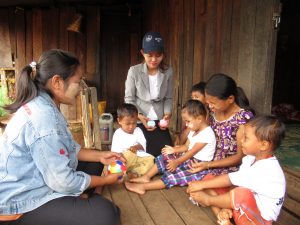Can anyone be taught to provide rehabilitation?
As populations age and chronic disease and disability increase, the demand for a workforce to maintain and improve physical functioning also increases. In rural parts of low- and middle-income countries, where rehabilitation professionals are scarce or absent, community-level rehabilitation workers are looked to for a basic version of this service.

The training for such a cadre is not easy to get right. The content must equip for a cross-section of basic tasks and responsibilities, as well as higher order problem-solving and communication skills. The level must suit those with minimal formal education and no health background, the teaching methodology must be competency-based, and the length must fit with what trainees and countries can afford.
These demanding requirements beg the question - can local people be trained for rehabilitation? A recent World Health Organisation initiative appears to answer, “No.” As part of the Rehabilitation 2030 strategy, the WHO is developing a new Basic Rehabilitation Training Package and Clinical Resource. The website lists prospective trainees as existing PHC nurses and doctors, as their educational level and health background will equip them to benefit from the brief (2-week) input. Community-level workers are not included, which leaves unresolved the problem of rehabilitation in places lacking well-functioning and good quality PHC facilities and staff.
Perhaps this situation might be different with a Vygotskyan scaffolding approach to rehabilitation training and trainees.
At a special education seminar for health professions, I had a light bulb moment in a recommendation to describe all children positively as learners on a learning journey, rather than as ‘able’ or ‘unable’ in relation to each other. The rationale given was that this not only supported inclusion, but better teaching, for when all learning levels are positively described, teachers can target and scaffold instruction to the learners before them. In relation to rehabilitation competency in community-level workers, this begs the question – is it their inadequacy that makes this unattainable, or has the domain and competencies of rehabilitation been insufficiently described to permit rehabilitation to be successfully taught to them? Has the WHO sufficiently expressed, for training purposes, what rehabilitation is?
While the nature of rehabilitation in the WHO’s new Package is not yet known, it has been defined in the Rehabilitation Competency Framework (RCF) as “a set of interventions designed to maximise functioning and reduce disability, with four direct interventions listed:
- education and training for self-efficacy and self-management
- provision, guidance, and modification of assistive products
- environmental modification
- use of preventative, restorative and compensatory exercises, techniques, and physical modalities.
The RCF also highlights roles and competencies for different levels of the workforce, for example, Level 1 workers meet basic needs, provide prescribed routine interventions, and support implementation of rehabilitation plans. These level descriptions are minimal, but are helpful, and worth expanding into a community-level rehabilitation training package, along the lines of our recent work in India.
In health, task-shifting to community cadres continues to be affirmed, providing best-practice conditions are met. One of these conditions is in the initial training, in trainers who know the learning path of rehabilitation and can tailor their input to learning stage. Without this, it is possible that the WHO’s critique of the rehabilitation learning capacity of community level workers is really a critique of trainers not knowing how to teach them.
Perhaps, rather than removing rehabilitation training from community-level workers because they are not competent enough, we should work on the ability of trainers to see competency and progress it.
Dr Lindsey Gale is a Research Fellow at The Nossal Institute for Global Health. She is involved in projects facilitating the training of grassroots workers for rehabilitation provision.